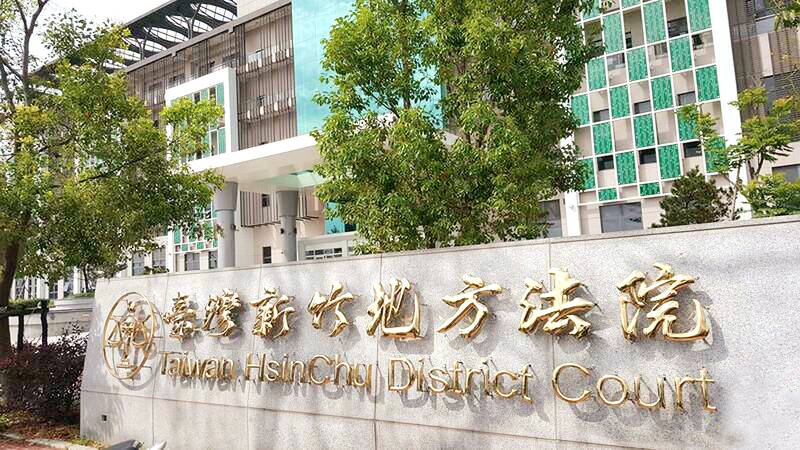The Hsinchu County District Court on Monday fined a criminal ring headed by Ho Ching-chung (何敬忠) NT$70 million (US$2.28 million) for illegal logging and poaching of protected wildlife in 2020.
Ho, 52, a resident of Hsinchu County’s Hsinchu’s Jianshi Township (尖石) died after being released on bail last year, the ruling said.
The group operated in the area for years, cutting down protected trees, such as red cypress and Taiwan yellow cypress, it said.

Photo: Tsai Chang-sheng, Taipei Times
The group also shot and killed a Formosan black bear, an endangered species and iconic symbol of Taiwan.
The 14 people were found guilty of contravening the Forestry Act (森林法), and ordered to pay NT$70 million in total fines, including more than NT$10 million each for three of the principal figures, the ruling showed.
In January 2020, after being tipped off, police intercepted and searched the vehicles of members of the group as they were traveling down a mountain road.
Aside from finding eight pieces of cypress wood in the vehicles, police found more logged tree remains, along with chainsaws and other tools, as well as canvas tents that the group used as temporary living quarters at the logging site.
The court denounced Ho and his accomplices for stealing 500kg of the nation’s valuable forestry resources, saying they have harmed efforts to protect the nation’s mountain forests and damaged the ecosystem.
“The suspects were accomplices in the illicit sale of these protected tree species and enticing other criminal elements to join the underground business of selling illegally logged trees,” it said.
An investigation found that the group sold illegally logged wood for NT$30,000 to NT$300,000 per piece.
The court sentenced members of the group from several months up to two-and-a-half years in prison.
After being released on bail in June last year, Ho went missing.
A body found in a mountainous area was confirmed to be that of Ho. He died of COVID-19.

The disruption of 941 flights in and out of Taiwan due to China’s large-scale military exercises was no accident, but rather the result of a “quasi-blockade” used to simulate creating the air and sea routes needed for an amphibious landing, a military expert said. The disruptions occurred on Tuesday and lasted about 10 hours as China conducted live-fire drills in the Taiwan Strait. The Civil Aviation Administration (CAA) said the exercises affected 857 international flights and 84 domestic flights, affecting more than 100,000 travelers. Su Tzu-yun (蘇紫雲), a research fellow at the government-sponsored Institute for National Defense and Security Research, said the air

Taiwan is to commence mass production of the Tien Kung (天弓, “Sky Bow”) III, IV and V missiles by the second quarter of this year if the legislature approves the government’s NT$1.25 trillion (US$39.78 billion) special defense budget, an official said yesterday. Commenting on condition of anonymity, a defense official with knowledge of the matter said that the advanced systems are expected to provide crucial capabilities against ballistic and cruise missiles for the proposed “T-Dome,” an advanced, multi-layered air defense network. The Tien Kung III is an air defense missile with a maximum interception altitude of 35km. The Tien Kung IV and V

Trips for more than 100,000 international and domestic air travelers could be disrupted as China launches a military exercise around Taiwan today, Taiwan’s Civil Aviation Administration (CAA) said yesterday. The exercise could affect nearly 900 flights scheduled to enter the Taipei Flight Information Region (FIR) during the exercise window, it added. A notice issued by the Chinese Civil Aviation Administration showed there would be seven temporary zones around the Taiwan Strait which would be used for live-fire exercises, lasting from 8am to 6pm today. All aircraft are prohibited from entering during exercise, it says. Taipei FIR has 14 international air routes and

Taiwan lacks effective and cost-efficient armaments to intercept rockets, making the planned “T-Dome” interception system necessary, two experts said on Tuesday. The concerns were raised after China’s military fired two waves of rockets during live-fire drills around Taiwan on Tuesday, part of two-day exercises code-named “Justice Mission 2025.” The first wave involved 17 rockets launched at 9am from Pingtan in China’s Fujian Province, according to Lieutenant General Hsieh Jih-sheng (謝日升) of the Office of the Deputy Chief of the General Staff for Intelligence at the Ministry of National Defense. Those rockets landed 70 nautical miles (129.6km) northeast of Keelung without flying over Taiwan,